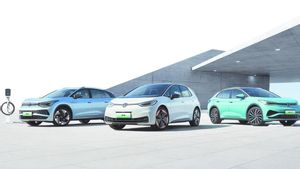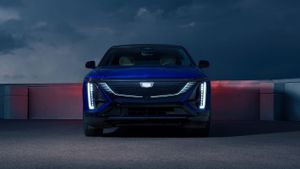JAKARTA - BMW, one of the largest car manufacturers in the world, leaked that their electric car with a solid-state battery only existed in 2030.
"We will not see a BMW solid-state production car series before 2030," Kurt Vandeputte, BMW's Battery Cell Manufacturing Competition Center (CMCC) manager told the media in the celebration of BMW Tech Office's 25th anniversary in Silicon Valley, recently., reported by BMWBlog, Sunday, December 10.
In this event, BMW gave an overview of the next generation Neue Classe model featuring cylindrical batteries, but BMW also discussed in depth their progress in the development of solid-state cells.
It is known that the Neue Classe architecture was built by prioritizing EVs, the upcoming BMW model can accommodate the two battery technologies above, even the Neue Classe architecture can accommodate hydrogen-powered drivetrains.
In November, it was stated that BMW received the first sample A of solid-state cells from Solid Power. Solid-state batteries are predicted to be much superior to lithium-ion batteries because of their lighter construction and smaller size.
In addition, this battery has a much higher energy density so it can provide a much better distance and support faster charging.
At Pardsorf, near Munich, BMW has set up a prototype production line for solid-state batteries at the Cell Manufacturing Competence Center (CMCC). BMW is rumored to have worked on a prototype featuring this technology, but mass production vehicles with solid-state batteries may still be far away.
Meanwhile, Toyota as the world's largest manufacturer has released a roadmap for their advanced battery technology in mid-September.
Takero Kato, the president of Toyota's new production facility, stated at the workshop Let's Change the Future of Cars that the next-generation Toyota electric model will produce 1.7 million out of 3.5 million BEV units which Toyota is expected to sell globally by 2030. It also highlights how a series of battery technologies will be key to attracting a wider customer base.
Toyota is also focusing on bringing solid-state batteries into mass production. The goal is for the battery to be ready for commercial use by 2027/28.
SEE ALSO:
What is a solid-state battery? Why is it so important?
Solid-state batteries have long been considered a potential game changer for BEV. BMW and Toyota have made breakthroughs in their bid to increase the resilience of this technology.
Unlike conventional lithium-ion batteries, solid-state batteries use solid electrolytes instead of liquid electrolytes or gels, thus offering some advantages.
Solid-state batteries are safer and more efficient, with the potential to improve performance, durability, and overall electric vehicle driving experience.
Additionally, solid-state batteries have a higher energy density compared to lithium-ion batteries, which allow them to store more energy per kilogram and consequently extend the reach of electric vehicles.
The solid structure of electrolytes in solid-state batteries also reduces the risk of fluid leakage, thereby reducing the potential danger of fire. The samples shown to us are rectangular and very thin. So from a packing perspective only, they should be a major increase over today's lithium-ion batteries.
The English, Chinese, Japanese, Arabic, and French versions are automatically generated by the AI. So there may still be inaccuracies in translating, please always see Indonesian as our main language. (system supported by DigitalSiber.id)















